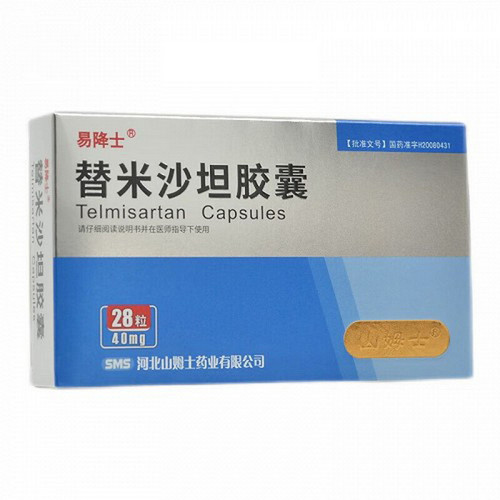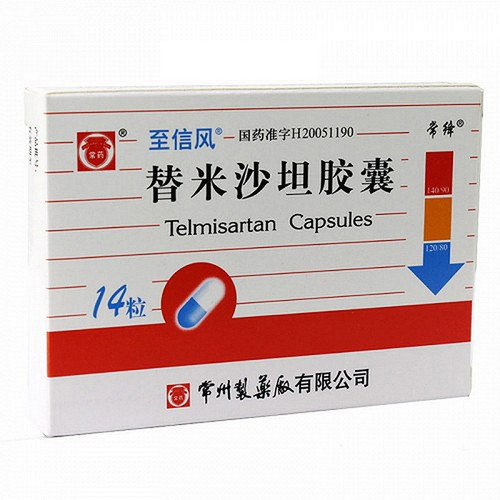Product Overview
[Drug Name]
Generic Name: Telmisartan Capsules
Trade Name: Shang Er Ning Telmisartan Capsules 40mg*12 capsules*3 plates
Pinyin Code: Shang Er Ning Ti Mi Sha Tan Jiao Nang 40mg*12Li*3Ban
[Main Ingredient]
The main ingredient of this product is telmisartan. Its chemical name is: 4-{1,4'-dimethyl-2-propyl(2,6-bi-1H-benzimidazole)-1'-methyl]-{11-biphenyl]-2-carboxylic acid. Molecular Formula:
C33H30N4O2 Molecular Weight: 514.63
[Properties]
This product is a capsule containing white or off-white granules or powder.
[Indications/Main Functions]
For the treatment of essential hypertension.
[Specifications]
40mg*12 capsules*3 plates
[Dosage and Administration]
Adults: Dosing should be individualized. The usual initial dose is one 40 mg tablet once daily. Telmisartan's antihypertensive effect is dose-dependent within the 20-80 mg dose range. If optimal blood pressure is not achieved after treatment, the dose can be increased, up to a maximum of 80 mg once daily. This product can be used in combination with thiazide diuretics, such as hydrochlorothiazide, which have a synergistic antihypertensive effect. Because telmisartan's maximum effect is not achieved until four to eight weeks after the start of treatment, this consideration should be taken when increasing the dose. Patients with Renal Impairment: Patients with mild or moderate renal impairment do not require dose adjustment. Telmisartan is not eliminated through hemofiltration. Patients with Hepatic Impairment: Patients with mild or moderate hepatic impairment should not use more than 40 mg daily. No dose adjustment is required for the elderly.
Children and Adolescents: Safety and efficacy data for this product have not been established in children and adolescents under 18 years of age. Adverse Reactions: In placebo-controlled trials, the overall incidence of adverse events with telmisartan (41.4%) was similar to that with placebo (43.9%). The incidence of adverse events was not dose-related or related to patient gender, age, or race. The following adverse reactions are cumulatively reported in 5,788 hypertensive patients treated with telmisartan in clinical trials. Adverse reactions are categorized by frequency as follows: Very common (>1/10); Common (>1/100 <1/10); Uncommon (>1/1000, <1/100); Rare (>1/10,000, <1/1000); Very rare (<1/10,000). Systemic Reactions: Common: Back pain (e.g., sciatica), chest pain, flu-like symptoms, symptoms of infection (e.g., urinary tract infection including cystitis). Rare: Visual disturbances, hyperhidrosis. Central and Peripheral Nervous System: Common: Dizziness. Gastrointestinal System: Common: Abdominal pain, diarrhea, dyspepsia. Gastrointestinal disturbances: Uncommon: dry mouth, flatulence. Musculoskeletal system: Common: arthralgia, leg cramps or leg pain, myalgia. Uncommon: tenosynovitis-like symptoms. Psychiatric system: Uncommon: anxiety. Respiratory system: Common: upper respiratory tract infections including pharyngitis and rhinitis. Skin and adnexal system: Common: skin disorders such as eczema. Additionally, since the marketing of telmisartan, individual case reports have included erythema, pruritus, syncope, insomnia, depression, stomach discomfort, vomiting, hypotension, bradycardia, tachycardia, dyspnea, eosinophilia, thrombocytopenia, weakness, and decreased work efficiency. Similar to other angiotensin antagonists, angioedema, urticaria, and other related adverse reactions have been reported in rare cases. Laboratory findings: Decreases in hemoglobin or increases in uric acid were occasionally observed in the telmisartan treatment group compared to placebo. Elevations in blood creatinine or liver enzymes were similar to or lower in telmisartan than in placebo. Contraindications:
Individuals with allergies to the active ingredient or any of the excipients of this product; those in mid- to late-pregnancy or breastfeeding; patients with biliary obstructive disease; patients with severe hepatic insufficiency; and patients with severe renal insufficiency (creatinine clearance < 30 ml/min).
[Precautions]
This product should not be used in patients with cholestasis, biliary obstructive disease, or severe hepatic impairment, as telmisartan is largely excreted in the bile, and clearance of this product may be reduced in these patients. This product should be used with caution in patients with mild to moderate hepatic insufficiency.
Renovascular Hypertension: In cases of bilateral renal artery stenosis or unilateral renal artery stenosis, the risk of severe hypotension and renal insufficiency is increased with the use of drugs that affect the renin-angiotensin-aldosterone system.
Renal Insufficiency and Renal Transplant Patients: This product should not be used in patients with severe renal insufficiency (creatinine clearance < 30 ml/min; see Contraindications). For patients with renal insufficiency, serum potassium and creatinine levels should be monitored regularly during use of this product. There are no data on the use of this drug in patients shortly after a recent renal transplant. Patients with Volume Depletion: Administration of this drug, particularly after the first dose, may cause symptomatic hypotension in patients with volume depletion or hyponatremia due to strong diuretic therapy, salt restriction, nausea, or vomiting. Therefore, serum sodium and volume levels should be corrected before using this drug. Other Conditions Related to Stimulation of the Renin-Angiotensin-Aldosterone System: In patients whose vascular tone and renal function depend primarily on the activity of the renin-angiotensin-aldosterone system (such as those with severe congestive heart failure or underlying renal disease including renal artery stenosis), the use of drugs that affect this system may cause acute hypotension, hyperazotemia, oliguria, or rarely, acute renal failure. Antihypertensive drugs that inhibit the renin-angiotensin-aldosterone system are generally ineffective in patients with primary aldosteronism. Therefore, this drug is not recommended for use in such patients. As with other vasodilators, patients with aortic or mitral stenosis or obstructive hypertrophic cardiomyopathy should be treated with caution using this drug. Electrolyte imbalances and hyperkalemia: Use of medications that affect the renin-angiotensin-aldosterone system may cause hyperkalemia, especially in patients with renal impairment and/or heart failure, as well as those with diabetes. However, for patients at risk, serum potassium levels should be closely monitored while taking this drug. Based on experience with other medications that affect the renin-angiotensin system, concomitant use of this drug with potassium-sparing diuretics, potassium supplements, potassium-containing salt substitutes, or other medications that increase serum potassium (such as heparin) can increase serum potassium levels. Therefore, caution should be exercised when using this drug with these medications (see Drug Interactions). Similar to angiotensin-converting enzyme inhibitors, the antihypertensive effect of this drug and other angiotensin antagonists is less in blacks than in other ethnic groups, possibly due to the higher prevalence of low renin levels in hypertensive individuals. As with other antihypertensive drugs, excessive blood pressure reduction can cause myocardial infarction or stroke in patients with ischemic heart disease or ischemic cardiovascular disease. Effects on Driving and Operating Machinery: The effects of this drug on driving and operating machinery have not been studied. However, caution is advised when driving or operating machinery, as antihypertensive therapy can sometimes cause dizziness and drowsiness.










